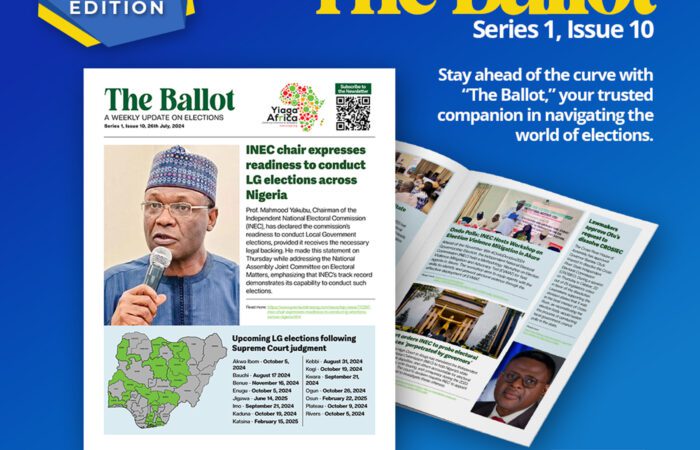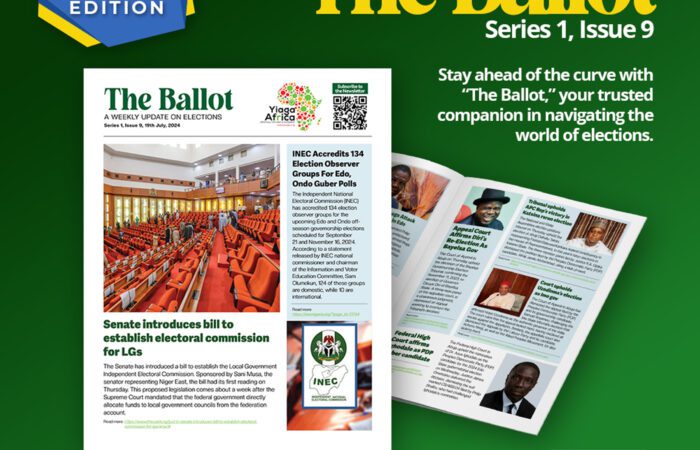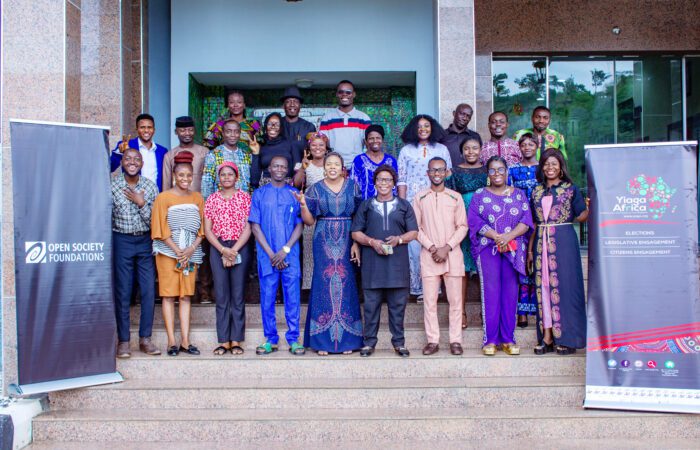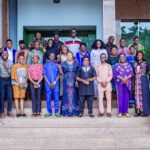On September 11th, 2021, the Independent National Electoral Commission (INEC) conducted a Bye-election for Isoko South 1 State Constituency of Delta State to fill a seat in the Delta State House of Assembly. The election beyond providing voters with the opportunity to choose their representative in the House of Assembly was also an opportunity for INEC to pilot the new Bimodal Voters Accreditation System (BVAS). The election which had 12 Political parties contesting for the seat was conducted in 84 polling units in 5 wards under the Isoko South 1 State constituency with a total of 58,353 voters scheduled to vote in the election. The bye-election was the first election where voters interacted with the BVAS before the November 6 Governorship election in Anambra State.
To provide independent oversight over the process, Yiaga Africa Watching The Vote (WTV) deployed trained citizen observers who served as mobile observers across the respective Wards (Emede, Irri 1, Irri 2, Oleh 1 and Oleh 2). The observers visited 20 of the 84 polling units where the bye-election was conducted. The observation primarily focused on the deployment, usage and functionality of the BVAS while also observing the general conduct of the election.
INEC had before the election informed stakeholders that it will be deploying a new technology called Bimodal Voters Accreditation System (BVAS) for the election. On election day, Bimodal Voter Accreditation System (BVAS) will be used for voter accreditation replacing the Smart Card Reader, and it also integrates the ZPAD to upload electronic results to the INEC results viewing portal. For voter accreditation, the BVAS was to ensure biometric authentication of voters either through fingerprint or facial authentication before each voter can vote.
Watching the Voter Findings on the Bye-Election
Yiaga Africa’s Watching the Vote findings is based on the report from WTV citizens observers from 20 of the 84 polling units across Emede, Irri 1, Irri 2, Oleh 1 and Oleh 2 Wards in Isoko South 1 State Constituency of Delta State where the election was held.
Deployment and Functionality of the Bimodal Voter Accreditation System (BVAS)
1. Deployment of the BVAS: The BVAS was seen in all the polling units that the WTV observers visited. Voter’s PVCs and fingerprints were verified and authenticated using the BVAS throughout the accreditation and voting process in the 20 polling units visited.
2. The functionality of the BVAS and the average time to process a voter using the BVAS: While the BVAS functioned throughout the day in most of the polling units visited, WTV observers reported that the BVAS malfunctioned but was fixed during the accreditation process in 4 of the polling units observed. Observers also reported that on average, it took between 2-5mins to accredit prospective voters using the BVAS while in some cases it took as long as 10mins.
3. Enforcing the ‘no electronic authentication no vote’ policy: WTV observers reported that in at least 16 polling units visited, between 1-5 voters were not allowed to vote because their fingerprints and facial authentication failed during the accreditation process.
Uploading Polling Unit Results on the INEC Results Viewing Portal
4. Uploading Polling Unit Results to the INEC Online Results Viewing Portal: The BVAS was largely used for the upload of polling units results to the INEC Result Viewing Portal. However, the uploading process was reportedly unsuccessful in one of the polling units observed while the observer was still at the location.
5. The INEC Results Viewing Portal: Yiaga Africa observed that the polling unit results from the 84 polling units where the election was conducted were completely uploaded on the results portal as of 8:30 pm on election day.
General Observation of the Election Day Process
6. Commencement of polls and deployment of polling officials: WTV observers reported that by 9:00 am accreditation and voting had started in most of the polling units visited.
7. Gender Disaggregation of Polling Officials: On average 3 polling officials were seen in polling units visited. WTV observers reported that at least one of the officials stationed at the polling unit was a woman.
8. Deployment of Security: Police and Nigerian Security and Civil Defence Corps personnel were seen in all the polling units visited.
9. Deployment of Party Agents: political parties deployed their agents to polling units, the party agents for the All Progressives Congress (APC), Peoples’ Democratic Party (PDP) and Social Democratic Party (SDP) were seen in all the polling units that WTV observers visited.
10. Adherence to COVID-19 Guidelines: The INEC polling officials failed to enforce compliance to the COVID-19 guidelines in some of the polling units visited. The physical distancing between voters on the queue was not maintained in the 7 polling stations observed, there was also poor compliance for voters to properly sanitize their hands and the requirement to clean every voters’ fingers with antiseptic during accreditation.
Critical Incident / Misconducts during the election process
1. Secrecy of the ballots was compromised: Observers reported that in Irri I Ward 10, with polling unit code 009, the secrecy of the ballots was compromised as people could see how voters marked their ballots. There was an altercation between party agents stationed at the polling unit who were aggrieved that the secrecy of ballots was compromised.
2. Violent disruption leading to the death of a Nigerian: Reports from polling units 005 and 007 in Irri ward 10 revealed that some unidentified gunmen stormed the polling units during the results counting process. They shot sporadically in the air and made away with the voting materials. While polling officials, security agents, observers and party agents scampered for safety, one person was shot dead in the process.
3. Voters allowed to vote without verifying the PVCs: observers reported that some voters were allowed to vote despite their PVCs not being verified by the BVAS. Specifically, this happened at polling unit 10/10/01/007 (Uruero Hall, Ukolob Qtrs) in Oleh 1 ward 01.
Recommendations
1. Yiaga Africa calls on INEC to document and investigate all the challenges experienced with the BVAS machine during the bye-election as the commission plans for state-wide deployment in Anambra during the governorship election. In addition, INEC should investigate why the BVAS took longer than 5 minutes to accredit voters in some locations during the bye-election and also conduct a technology infrastructure assessment ahead of the deployment in Anambra.
2. INEC should consistently train its ad-hoc staff to build their capacity on how to use the BVAS to avert any form of capacity gap in the deployment of the system.
3. Ahead of the Anambra election, Yiaga Africa calls on INEC to commence early voter education and stakeholders engagement in the State on the new system and its potentials to improve transparency in the electoral process.
4. INEC should commence an immediate review and timely release of the Manual and the Guideline for Election especially for stakeholders and election observation groups getting ready for the Anambra governorship election.
5. Yiaga Africa urges the National Assembly as it resumes from its annual recess, to accelerate the passage of the electoral amendment bill that legalises the deployment of technology for accreditation, voting and transmission of election results.
Conclusion
The pilot deployment of the Bimodal Voters Accreditation System in the Isoko South 1 Constituency bye-election was relatively successful with a few challenges recorded in some locations. While the deployment of the BVAS for the bye-election is a good sign towards the preparation for the Anambra Governorship election, it is imperative for the commission to bridge all gaps as it plans for a bigger deployment in November. This includes addressing early emerging concerns around the capacity of Adhoc staff and connectivity of the device across all locations.
Yiaga Africa commends the Independent National Electoral Commission (INEC) for its consistent effort to improve the quality and transparency of elections particularly in the deployment of technology in the electoral process. Yiaga Africa sincerely appreciates the Watching the Vote citizens observers who observed the process for their commitment to credible elections. Yiaga Africa commends the voters in Isoko South 1 Constituency for turning out to vote.
Signed:
Cynthia Mbamalu
Director or Programs, Yiaga Africa
Share your feedback with us via feedback@yiaga.org






